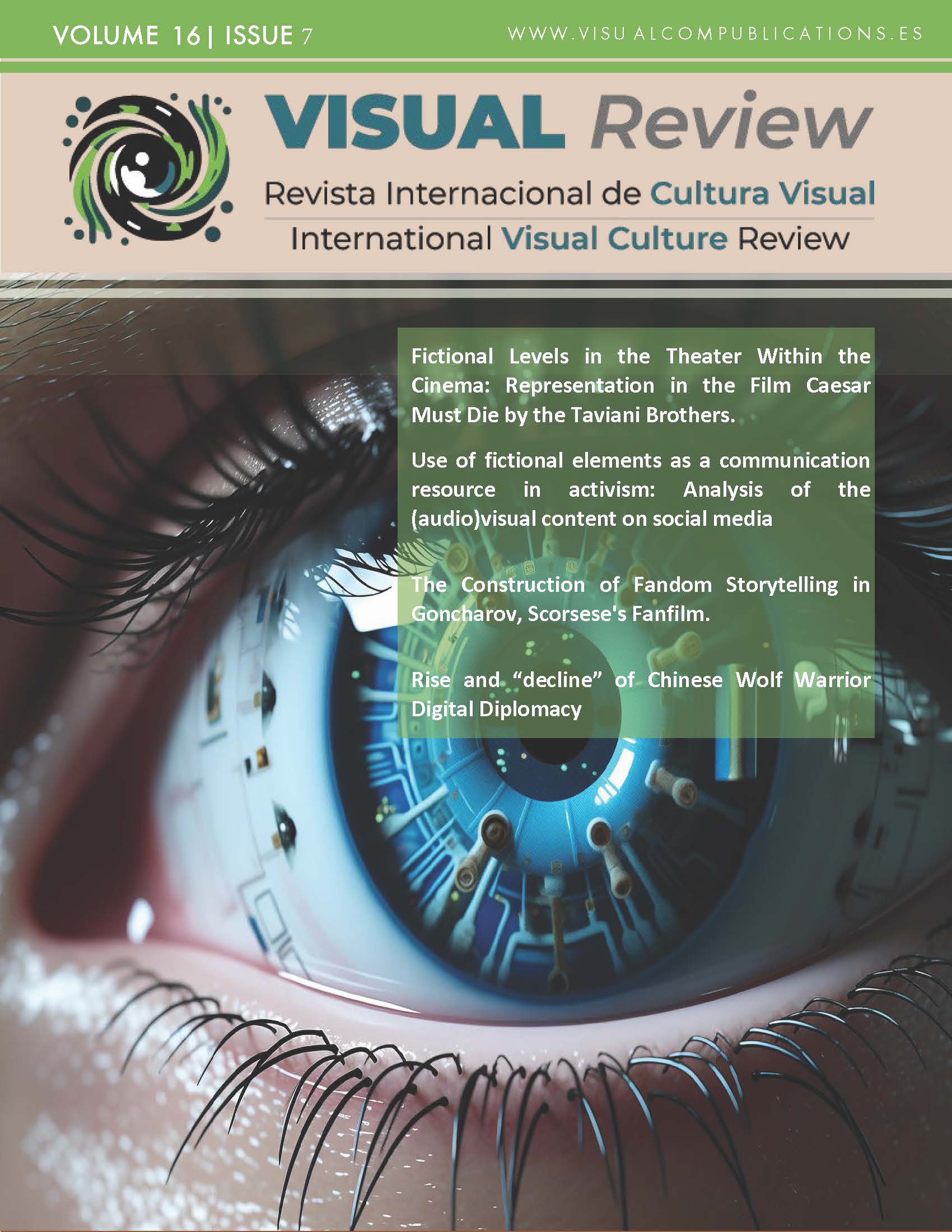Rise and “decline” of Chinese Wolf Warrior Digital Diplomacy
DOI:
https://doi.org/10.62161/revvisual.v16.5334Keywords:
China, Digital diplomacy, Wolf Warrior, Twitter, United StatesAbstract
Chinese officials use social media to project their discourse abroad. The use of wolf warrior diplomacy promotes a positive image of China's achievements and criticizes the West through disinformation techniques and through social media. Chinese assertiveness is increasing in foreign policy and coordinated from the leadership of the Communist Party on issues of national interest such as Xinjiang, Taiwan and Hong Kong or in defense of policies to control the COVID-19 pandemic. However, the toughness of digital diplomacy could decline if Beijing wants to maintain relations with the West in a period of adjustment like the one it is experiencing.
Downloads
Global Statistics ℹ️
|
579
Views
|
231
Downloads
|
|
810
Total
|
|
References
Bjola, C. (2018) Diplomacia digital 2.0: tendencias y resistencias. Revista Mexicana de Política Exterior, núm. 113, mayo-agosto, pp. 35-52, ISSN 0185-6022. Benedicto, M. A. (2020) China y la Belt and Road Iniciative: un arma de doble filo (del Soft power al Sharp power) para transformar el mundo. En Gonza lez del Min o, P. (Coord.) El sistema internacional del siglo XXI (pp. 305-325). Tirant Lo Blanch. Benedicto, M.A. (2021) China y el uso de desinformación en Europa durante la Covid-19: de socio estratégico a rival sistémico; en Sánchez, B. y Pineda, A. Comunicación política en el mundo digital: tendencias actuales en propaganda, ideología y sociedad. Pags. 649-662 Editorial Dykinson.
Breslin, S. (2020): China’s Global Cultural Interactions, en D. Shambaugh (ed.), China and the World, Nueva York, Oxford University Press, pp.137-155 DOI: https://doi.org/10.1093/oso/9780190062316.003.0007
Cull, N. (2008) Diplomacia pública: consideraciones teóricas. Revista Mexicana de Política Exterior. Nº85. Noviembre de 2008-febrero de 2009 https://revistadigital.sre.gob.mx/index.php/numeros-anteriores/116-rmpe85
Huang, Z.A. (2021) Wolf Warrior and China’s digital public diplomacy during the COVID-19 crisis. Place Brand Public Diplomacy. https://doi.org/10.1057/s41254-021-00241-3 DOI: https://doi.org/10.1057/s41254-021-00241-3
Julienne, M.; Hanck, S. (2021) Diplomatie chinoise: del’« esprit combattant » au « loup guerrier Institut français des relations internationales | Politique étrangère 2021/1 Printemps | pages 103 à 118. DOI 10.3917/pe.211.0103 https://www.cairn.info/revue-politique-etrangere-2021-1-page-103.htm DOI: https://doi.org/10.3917/pe.211.0103
Landale, J. (2020) Guerreros lobo, el nuevo ejército de diplomáticos que defiende a China en el mundo durante la pandemia. BBC. Disponible en: https://www.bbc.com/mundo/noticias-internacional-52671311
Manfredi, J.L. (2014) Taxonomía de la diplomacia digital en la agenda de las nuevas relaciones internacionales. https://doi.org/10.5209/rev_HICS.2014.v19.47299( Manfredi, J.L. (2024) Unfair competition: How states use disinformation to exercise Public Diplomacy. International Journal of Communication 18, 1426-1448.
Martin, P. (2021) China's Civilian Army: The Making of Wolf Warrior Diplomacy. New York. Oxford University Press.
Melissen, J. (2005) The New Public Diplomacy. London, Palgrave. DOI: https://doi.org/10.1057/9780230554931
Nye, J. (2004) Soft Power: The Means to Success in World Politics. Public Affairs.
Nye, J. (2021) Soft power: the evolution of a concept, Journal of Political Power, DOI: 10.1080/2158379X.2021.1879572 DOI: https://doi.org/10.4324/9781003200673-12
Ríos, X. (2021): La Metamorfosis del Comunismo en China, Kalandraka Editora, Pontevedra. DOI: https://doi.org/10.2307/jj.4449575.4
Sayama, O. (2016) China´s approach to soft power. Royal United Services. Institute for Defense and Security Studies.
Singh, M. (2018) From Smart Power to Sharp Power: How China Promotes her National Interests, Journal of Defence Studies, Vol. 12, No. 3, July-September 2018, pp. 5-25
Surahman, M. (2014). Twiplomacy: how Twitter affects contemporary public diplomacy. Universitas Paradina.
Walker, C. and Ludwig, J. (2017a). The Meaning of Sharp Power. Foreign Affairs. https://www.foreignaffairs.com/articles/china/2017-11-16/meaning-sharp-power
Walker, C. (2018). What Is "Sharp Power"? Journal of Democracy, 29 (3), 9-23. DOI: https://doi.org/10.1353/jod.2018.0041
Yuan, S. (2023) Tracing China’s diplomatic transition to wolf warrior diplomacy and its implications. Humanit Soc Sci Commun 10, 837. https://doi.org/10.1057/s41599-023-02367-6 DOI: https://doi.org/10.1057/s41599-023-02367-6
Zabala, P. (2022) La diplomacia digital de la Union Europea: pandemia y lucha contra la desinformación. Edit. Reus. Zhao, S. (2020): China’s Foreign Policy Making, en D. Shambaugh (ed.), China and the World, Nueva York, Oxford University Press, pp. 85-112.
Downloads
Published
How to Cite
Issue
Section
License
Copyright (c) 2024 VISUAL REVIEW. International Visual Culture Review / Revista Internacional de Cultura Visual

This work is licensed under a Creative Commons Attribution-NoDerivatives 4.0 International License.
Those authors who publish in this journal accept the following terms:
-
Authors retain copyright.
-
Authors transfer to the journal the right of first publication. The journal also owns the publishing rights.
-
All published contents are governed by an Attribution-NoDerivatives 4.0 International License.
Access the informative version and legal text of the license. By virtue of this, third parties are allowed to use what is published as long as they mention the authorship of the work and the first publication in this journal. If you transform the material, you may not distribute the modified work. -
Authors may make other independent and additional contractual arrangements for non-exclusive distribution of the version of the article published in this journal (e.g., inclusion in an institutional repository or publication in a book) as long as they clearly indicate that the work was first published in this journal.
- Authors are allowed and recommended to publish their work on the Internet (for example on institutional and personal websites), following the publication of, and referencing the journal, as this could lead to constructive exchanges and a more extensive and quick circulation of published works (see The Effect of Open Access).














